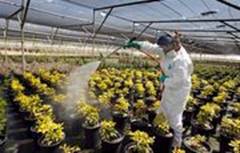|
 It seems Dow Chemical is in some trouble for the way it has marketed its pesticide, Dursban, in India. According to a report in the Hindustan Times, a Dow subsidiary could be blacklisted for allegedly bribing Indian officials to allow sales of Dursban there. Dursban has already been banned in the US, although Dow still markets an agricultural version of the pesticide called Lorsban. The active ingredient in Dursban, chlorpyrifos is known to be toxic to humans and can cause muscle spasms, dizziness, seizures, vomiting, diarrhea and paralysis. It seems Dow Chemical is in some trouble for the way it has marketed its pesticide, Dursban, in India. According to a report in the Hindustan Times, a Dow subsidiary could be blacklisted for allegedly bribing Indian officials to allow sales of Dursban there. Dursban has already been banned in the US, although Dow still markets an agricultural version of the pesticide called Lorsban. The active ingredient in Dursban, chlorpyrifos is known to be toxic to humans and can cause muscle spasms, dizziness, seizures, vomiting, diarrhea and paralysis.
Outside the US, Dow continues to market Dursban as safe. In Iran for example, Dow’s sales literature claims Dursban has “an established record of safety regarding humans and pets.” Since its June 2000 phase-out in the U.S., Dow has aggressively marketed Dursban in India as a safe household chemical. In 2007, Dow Chemical was fined $325,000 by the US Securities and Exchange Commission (SEC) over Indian bribery charges. According to the SEC, a Dow subsidiary had been trying to circumvent the Indian registration process for three pesticides, one of which was Dursban. According to the Hindustan Times, this past June the leader of India’s Communist party demanded a probe into the alleged corrupt practices used by Dow Chemical to market Dursban, including allegedly bribing Indian officials. In a response dated July 15, Union Agriculture Minister Sharad Pawar said “a show cause notice has been issued to Dow Agro Sciences India Private Limited and Agro Pak as to why they shouldn’t be blacklisted and excluded from purchases of pesticides made by the government.” Pawar also said that a fresh review on the “safety and efficacy” of pesticides that were cleared for sales following the alleged bribery had been ordered. Dow is also facing heat over the use of chlorpyrifos in the US.
As we reported last week, the Natural Resources Defense Council and Pesticide Action Network North America have filed a lawsuit in federal court in New York seeking a total ban on chlorpyrifos. The two groups are seeking to force the Environmental Protection Agency (EPA) to act on a three-year-old petition to remove the product from the market. EarthJustice filed the lawsuit on behalf of the two groups. "This dangerous pesticide has no place in our fields, near our children, or on our food,” EarthJustice attorney Kevin Regan said in a statement. "We’re asking a court to rule so that EPA will finish the job and ban this poison.”
|
